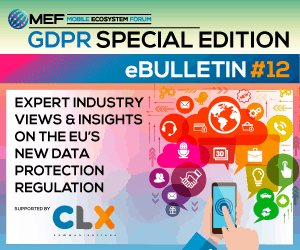The GDPR special edition of MEF’s eBulletin series, supported by CLX Communications, highlights the perspectives of the diverse MEF membership and experts on their path to preparing for GDPR compliance and the bigger journey ahead in ensuring that GDPR supports the innovation and growth of a connected and trusted data driven world.
Here representatives from different ends of the mobile ecosystem share their unique experiences with GDPR preparations – hear how Telecoming, Digi.Me, Zeotap and Trunomi describe the impact of the regulation on their business and how they see the industry evolving in a post-GDPR world.
Roberto Monge, Chief Operations Officer, Telecoming
GDPR & Direct Carrier Billing
GDPR is called to bring an in-depth transformation of the existing data protection landscape for all industries, including mobile payments.
In particular, it’s worth noting that Direct Carrier Billing, due to the nature of its monetization technology, minimizes the persistent data request, reason for which it offers solid anti-fraud guarantees. Nonetheless, all DCB actors are bound to the paths drafted by carriers and these are going to set the broad lines for their partners, in spite of the specific compliance guidelines which we all must follow.
All the mobile industry, among others, must be aware of the data protection impact over the different business divisions in each company. The GDPR challenge must be understood as a unique opportunity to further adapt businesses to a new personal data conception and as the healthiest exercise towards trustworthy relations with stakeholders.
Julian Ranger Chairman & Founder, digi.me
GDPR and the Internet of Me
Personal data privacy finally gets serious. Not only will GDPR upend the current and dominant data tracking model, but it will throw open innovation for those platforms and services, like digi.me, that see an opportunity to do good and personalise offerings and services by harnessing the possibilities of fully consented data streams.
On the other side of the coin, public awareness of, and disquiet with, the data-hoovering tech behemoths of Facebook and Google is also growing. Are these internet monopolies too big to fail? Almost certainly – but expect to see more calls for at least some regulation, as the impacts of failure to ensure accountability up to this point become evident in every aspect of our society,
economy and politics.
2018, too, following a tumultous year where the mass hacks of Yahoo and Equifax were revealed, is likely to a) see more hacks and b) with this, more awareness of the need to decentralise data to stop creating honeypots.
A growing awareness of the insecurity of personal data generally is also likely to feed into demands from consumers to both have it returned to them, and for those companies that still store it to take greater steps to secure it.
We’ve always said that personal data is best kept by the person who has most vested in it, both for safety and for them to choose how it and with whom it is shared, and 2018 looks firmly set to be the year where that gains currency. Exciting and innovative times ahead – and we can’t wait!
Florian Lichtwald SVP Global Telecom Data Partnerships, Zeotap
GDPR and Data Monetisation
Although it is true that the GDPR presents many challenges for the entire digital community at this very moment, in the long-run it actually has two large advantages.
Firstly, it forces the industry to enter into a dialogue with consumers and make them a more active participant of the digital ecosystem able to choose if they want to pay with money or attention and in what mix.
Secondly, it provides a much more harmonised framework across the 28 member states of the EU. Since the industry is very global, it also acts as a guiding star for practices in North America and Asia. The digital ecosystem hardly stops at the borders of countries, so the legislation around data privacy, data protection and data exchange needs to have that capability as well.
At zeotap, we’ve always seen privacy and security as an ethical obligation and since we work with the large telcos an absolute necessity and quite frankly a huge potential competitive advantage. Looking back I think what makes an incredible difference is if you approach the topic with fear or with the vision of a better ecosystem in mind. Fear is always an inhibitor… while curiosity and the willingness to build something is a very effective facilitator.
We always saw GDPR as a positive challenge and already had our GDPR-ready certification in 2016 as the first data platform working with telecom operators and one of the first digital players worldwide. And that was clearly an outcome of our positive and open attitude towards the upcoming regulation.
Stuart Lacey, CEO and founder, Trunomi
Automating Consumer Consent: Data Privacy In The Age Of Data Capitalism
Unless businesses want to be on the front page; consumer trust in data privacy is essential. GDPR introduces the key principles of data privacy by design and default. Consumers and business are recognizing that data privacy is more than just data protection and security.
For data privacy to exist in the age of data capitalism the consumer must be at the core of that business model. Consumers must be in control and be empowered to monetize their own data. Businesses are not only racing against the GDPR countdown clock – they’re also worried about their reputations – and no one wants to be the last company to care about their customer’s data rights.
The GDPR sets a higher standard for consent – it must be an affirmative, unambiguous action and granular for specific processing operations. There is no ‘grandfathering’ under GDPR and as a result businesses are very concerned that this means they will no longer be able to use their existing customer data. There is also a new burden for demonstrating consent and keeping records all data processing. Business are either remediating their databases to get the required consent, or they’re scrambling to find another legal basis.
The UK Information Commissioner Elizabeth Denham said it best at the DMA Data Protection Summit in February 2018: “It seems to me that a lot of energy and effort is being spent on trying to find a way to avoid consent. That energy and effort would be much better spent establishing informed, active, unambiguous consent. You say you will lose customers. I say you will have better engagement with them and be better able to direct more targeted marketing to them. You will have complete confidence that your customers have given informed consent.”
Trunomi consent and data rights management allows business to automate consent, comply with GDPR and provide their customers with control and transparency – to the benefit of the customer relationship.
Download the free GDPR Ebulletin now
With unique insight and analysis on enterprise messaging, permission and consent, the monetisation of personal data post GDPR, customer profiling and cultural and behavioral changes, the GDPR special edition eBulletin provides an invaluable glimpse into how businesses are meeting their obligations under the EU’s new data protection regulation, and how they see the industry in a post-GDPR world.
MEF’s GDPR eBulletin is available now










